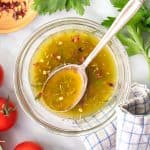NSW Health warns about the dangers of hand sanitiser: "The amount you use matters"
- Replies 6
Ever since the pandemic started, the use of hand sanitisers and other cleaning products against viruses and bacteria has greatly increased not just in Australia but all over the world.
While this has no doubt helped reduce the transmission of the coronavirus, it was found that they could also present problems for human health.
These hand sanitisers usually contain ethanol, isopropyl alcohol, n-propyl alcohol, or their combinations. Whilst helpful when used according to manufacturer's guidelines, these substances can become toxic to humans when ingested or absorbed through the skin.
On Sunday, NSW Health posted on their official Twitter account about the dangers of hand sanitisers if used incorrectly and warned the public that some cases can be poisonous, especially for young children.
NSW Health warns Aussies of hand sanitiser's potential dangers. Credit: Getty Images.
Apparently, some imported hand sanitisers were not properly regulated and may contain an even more dangerous and more toxic component – methanol.
Methanol, which is also known as methyl alcohol or wood alcohol, is a colourless, flammable liquid that is mostly used to create fuel, solvents, and antifreeze.
Whilst methanol is an alcohol like ethanol and isopropanol alcohol, it must not be used in hand sanitisers as it breaks down and produces different chemicals in the body than its safer counterparts.
The Centres for Disease Control and Prevention in the United States has already reported 15 cases of methanol poisoning associated with the use of hand sanitisers just last year.
Four of the patients died, and three had permanent damage to their vision.
According to NSW Health, even overuse of the 'safer' hand sanitisers can have negative effects on people's health as well.
Because of the high alcohol content, overuse of hand sanitisers can cause skin irritation and may produce vapours that could cause harm to people's airways.
To keep those germs and viruses at bay, while keeping yourself safe in the process, NSW Health released some guidelines on how to use hand sanitisers properly.
- To avoid frequent use of alcohol-based hand sanitisers, wash hands with soap and water for at least 20 seconds instead.
- Follow the instructions on the bottle – the amount you use and how long you spend applying it will affect how well it works.
- It's also important to remember that if hand sanitiser is left in the heat, the alcohol in it will evaporate and it won't work as effectively as before, so don’t leave it in the car in hot weather or in warmer places of the house.
- Hand sanitiser can be dangerous if swallowed, and in some cases, it can be poisonous, especially for children. Always watch young children as they apply hand sanitiser and then put the bottle in a safe place so they can’t use it without your supervision.
- Be careful because some imported hand sanitisers won't be labelled clearly and may contain methanol and other stronger alcohol products that are even more toxic.
- In the event that you or someone you know have accidentally swallowed hand sanitiser, even just a small amount, call the 24-hour Poisons Information Centre on 13 11 26 immediately for first aid and monitoring advice. Have the bottle of hand sanitiser with you when you call.
Source: www.nsw.gov.au
According to this video, a palm-full of alcohol-based hand sanitiser is more than enough to properly cover all hand and wrist surfaces. For a quick demonstration of correct hand hygiene, check out this video below:
Credit: UT Physicians.








